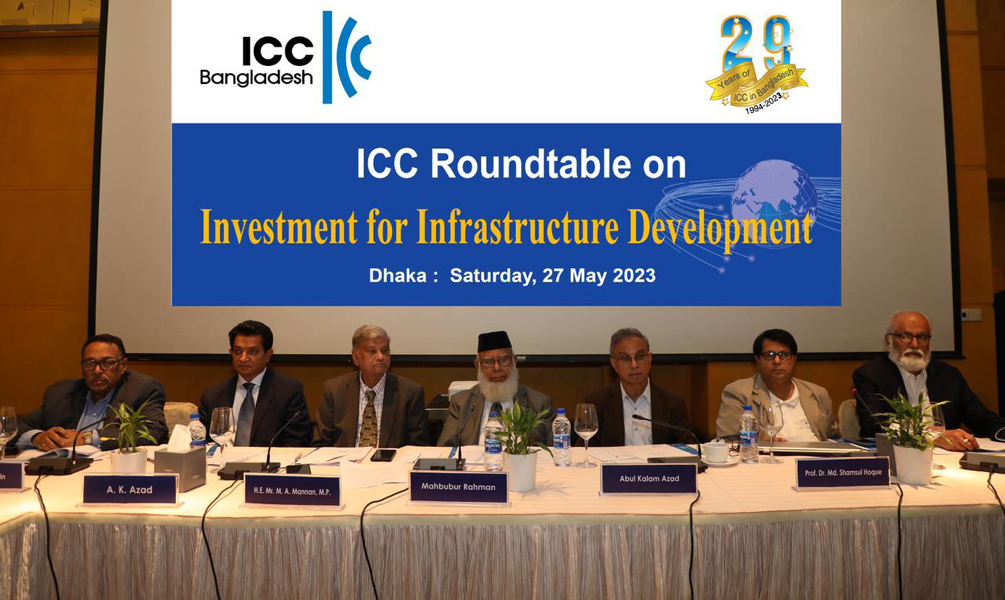
Published :
Updated :

Planning Minister MA Mannan on Saturday emphasised the expansion of the railways, saying that this cost-effective sector needs to be upgraded.
He said this in a Roundtable on Investment for Infrastructure Development organised by the International Chamber of Commerce, Bangladesh at a city hotel.
He mentioned that Dhaka-Chittagong Railway is under construction for a double track, this will also be in consideration, according to a press release.
The Minister also emphasised a Circular Road surrounding Dhaka City.
However, he noted down the demand of the businesses regarding Dhaka-Chittagong elevated expressway and assured that he will try to forward this.
He said that in the last 10-12 years the government has taken huge amounts of infrastructure work and obviously people are getting the result.
ICC Bangladesh President Mahbubur Rahman with the opening of Padma Bridge, completion of 55 kilometres Elevated Expressway from Gazipur connecting northwestern region of the country to Chattogarm, movement of traffic is expected to increase manifold.
But according to experts, the existing 4-lane highway will not be able to facilitate smooth movement of vehicles, he added.
He mentioned that the economic importance of this route is immense; considering Chittagong Port connectivity as an access point to the international market. It is also inevitable to consider a network with Matarbari economic hub of BIG-B, BCIM and potentials of connecting BIMSTEC & SASEC through Asian Highway.
“Our international trade exceeded $100 billion and is expected to grow considering post LDC export diversification potentials. Government targeted $80 billion export by 2024.”
Mahbubur Rahman said that evolving economic targets require deep and inclusive connectivity and communicationdevelopment with far-reaching implications.
“By some estimate, Bangladesh will require to make investments of well over $100 billion in the course of the next decade to build ports and roads, set up rail lines for management of goods, establish power-generation & distribution capabilities, provide utilities and services to meet the ever-increasing demands of the economy,” he mentioned.
Keynote speaker Mr. Md. Shamsul Hoque, PhD, Director, Accident Research Institute (ARI) and Professor, Department of Civil Engineering, BUET in his keynote emphasised to continuously increasing the quality of infrastructure, with the hallmark attribute of uninterrupted, sustained high-speed mobility.
He said Bangladesh currently lacks full-access controlled infrastructure, indicating an acute shortage of quality roads with arterial configurations.
To achieve a balanced pyramid of different road categories, he said, in line with global standards, there should be at least 2-5 per cent of highways with access controlled configurations in Bangladesh. To maintain a higher growth trajectory even after LDC graduation, including double-digit GDP growth and achieving a multi-trillion dollar economy, Bangladesh needs to develop a balanced multimodal transport infrastructure system based on the three pillars of Rail, River and Road (3R).
He observed that for the integrated and planned development of national multimodal infrastructure, it is essential for the Planning Commission to assume a vital role. This can be achieved by strengthening its institutional capacity through the establishment of a robust planning unit comprising highly qualified professional planners.
In the Round Table discussant emphasized on Dhaka-Chittagong elevated expressway which will help in reducing cost and time both import and export as well as make it cost effective and competitive in the international market. The elevated expressway will save much needed agricultural land. It is also pointed out that like all other developing countries investment in infrastructure should be at least 6%-7%. Dhaka-Chittagong elevated expressway will also boost regional connectivity.
The discusants praised the Prime Minister for establishing the National Logistic Development and Coordination Committee to set logistic and infrastructure policy.


 For all latest news, follow The Financial Express Google News channel.
For all latest news, follow The Financial Express Google News channel.